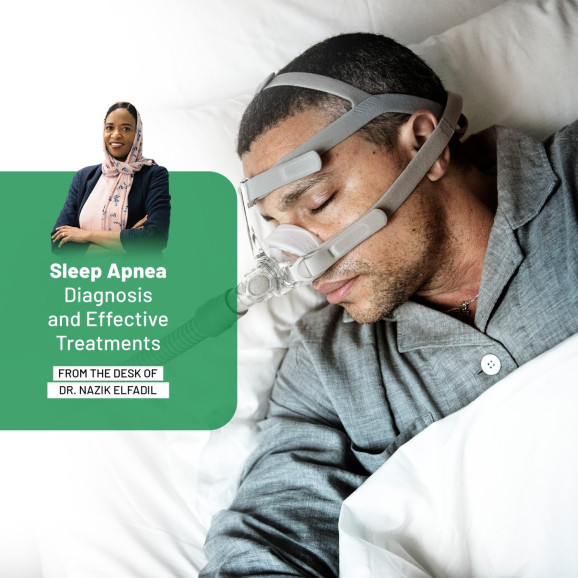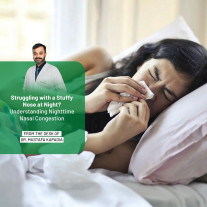Sleep Apnea Diagnosis and Effective Treatments
Contact Us
Do you wake up in the middle of the night gasping or briefly struggling to breathe? Does your partner frequently complain about your loud snoring? These could be signs of a common but serious sleep disorder called sleep apnea. This condition causes repeated pauses in breathing during sleep due to airway obstruction or neurological issues.
Sleep apnea often goes unnoticed by sufferers, but the effects on your health and quality of life can be severe. Fortunately, with early diagnosis and proper treatment, you can regain restful sleep and improve your overall wellbeing. At Tarabichi ENT, recognized as the Best ENT Specialist in Dubai, and home to the Best ENT clinic in Dubai, we provide expert care and the best sleep apnea treatment in Dubai.
In this blog, we’ll explain what a sleep apnea diagnosis means, the different types of sleep apnea, signs and symptoms, risks of leaving it untreated, and the effective treatments available today.
What is Sleep Apnea?
Sleep apnea is a disorder where breathing stops or becomes very shallow during sleep. These breathing pauses last at least 10 seconds and can happen hundreds of times per night. Each pause causes a drop in oxygen levels, forcing your brain to briefly wake you to resume breathing. This cycle disrupts deep, restorative sleep and leads to daytime fatigue and other health risks.
There are two primary types of sleep apnea:
Obstructive Sleep Apnea (OSA)
OSA is the most common form of sleep apnea. It occurs when the throat muscles and soft tissues relax excessively during sleep, blocking the airway. This obstruction leads to breathing interruptions and often causes loud snoring. You may also experience choking or gasping sounds when the airway is momentarily blocked.
OSA can affect anyone but is more common in people who are overweight, have a large neck circumference, or have anatomical features that narrow the airway.
Central Sleep Apnea (CSA)
CSA is a less common form of sleep apnea and happens when the brain fails to send the proper signals to the muscles controlling breathing. Unlike OSA, people with CSA rarely snore. CSA is often linked with underlying medical conditions such as heart failure, stroke, or neurological disorders.
Mixed or Complex Sleep Apnea
This condition is a combination of both obstructive and central sleep apnea. It usually starts as central sleep apnea and later includes obstructive events.
Signs and Symptoms of Sleep Apnea
Many people with sleep apnea don’t realize they have the condition, especially because it occurs during sleep. However, certain signs can indicate a problem, and often a sleeping partner will notice symptoms first.
Common signs of sleep apnea include:
- Loud, persistent snoring that disrupts sleep
- Choking, gasping, or silent pauses in breathing during sleep
- Excessive daytime sleepiness or fatigue despite adequate hours in bed
- Morning headaches due to oxygen deprivation
- Dry mouth or sore throat upon waking
- Difficulty concentrating, forgetfulness, or brain fog
- Mood changes, such as irritability, anxiety, or depression
- Restless sleep or frequent waking
- Reduced libido or sexual dysfunction
- Frequent need to urinate during the night
If you or your partner notice these symptoms, a consultation with the best ENT Specialist in Dubai at Tarabichi ENT is essential for an accurate diagnosis.
Why is Untreated Sleep Apnea Dangerous?
Leaving sleep apnea untreated can have serious consequences. The repetitive oxygen drops and disrupted sleep impact multiple body systems.
Potential risks include:
- High Blood Pressure and Heart Disease: Repeated oxygen deprivation causes increased strain on the heart, raising blood pressure and the risk of heart attacks and heart failure.
- Atrial Fibrillation: This irregular heartbeat is common in sleep apnea patients and increases the risk of stroke.
- Stroke: Sleep apnea significantly raises stroke risk, especially if combined with high blood pressure or atrial fibrillation.
- Metabolic Syndrome and Diabetes: Sleep apnea is linked to insulin resistance and higher rates of Type 2 diabetes.
- Liver Problems: Abnormal liver function tests are more common in patients with sleep apnea.
- Impaired Mental Function: Lack of sleep impairs concentration, memory, and decision-making, affecting personal and professional life.
- Increased Accident Risk: Daytime sleepiness causes more vehicle and workplace accidents.
Because of these risks, early diagnosis and treatment are crucial to protect your health and safety.
How is Sleep Apnea Diagnosed?
At Tarabichi ENT, the Best ENT clinic in Dubai, a comprehensive evaluation is performed by the best ENT Surgeon in Dubai and best ear doctor in Dubai. Diagnosis often involves:
- Detailed medical history and symptom discussion
- Physical examination of the airway, nose, and throat
- Sleep study (polysomnography) to monitor breathing, oxygen levels, and brain activity during sleep
- Home sleep apnea testing may be offered for convenience
Once diagnosed, a tailored treatment plan can be created.
Treatment Options for Sleep Apnea
Treatment depends on the severity and type of sleep apnea. At Tarabichi ENT, the best sleep apnea treatment in Dubai includes:
Lifestyle Changes
For mild cases, lifestyle adjustments can significantly improve symptoms:
- Maintain a healthy weight through diet and exercise
- Quit smoking, which worsens airway inflammation
- Avoid alcohol and sedatives before bed as they relax throat muscles
- Sleep on your side to prevent airway collapse
- Establish a consistent sleep routine
Continuous Positive Airway Pressure (CPAP)
CPAP therapy is the most common and effective treatment for moderate to severe sleep apnea. A CPAP machine delivers a continuous flow of pressurized air through a mask, keeping the airway open. Most patients experience significant symptom relief with consistent use.
Bi-level Positive Airway Pressure (BPAP)
BPAP devices provide variable pressure when inhaling and exhaling, offering more comfort for some patients, especially those with central sleep apnea.
Oral Appliance Therapy
Custom-fitted oral appliances reposition the jaw or tongue to prevent airway blockage. This option is beneficial for patients who cannot tolerate CPAP.
Inspire Therapy
This FDA-approved implantable device stimulates airway muscles to prevent collapse, offering an alternative for patients with obstructive sleep apnea.
Surgical Treatment
Surgery is considered when other treatments fail or anatomical issues contribute to sleep apnea. Options include:
- Correcting a deviated septum to improve nasal airflow
- Removing enlarged tonsils or adenoids
- Removing nasal polyps blocking the nasal passage
- Reshaping the jaw or palate to enlarge the airway
Your Best ENT Surgeon in Dubai will advise on the best surgical approach if needed.
Take Control of Your Sleep Health Today
Sleep apnea can profoundly affect your life but is treatable. If you experience symptoms like loud snoring, daytime fatigue, or choking during sleep, seek help promptly.
Visit Tarabichi ENT, the home of the best sleep apnea treatment in Dubai, for expert diagnosis and personalized care. Don’t let sleep apnea control your life regain restful sleep and improved health with our team of the Best ENT doctors in Dubai, at Tarabichi Healthcare is committed to delivering world-class care with precision and compassion.
Meet our dedicated specialists: Dr. Muaaz Tarabichi, Dr. Michael Timms, Dr. Mustafa Kapadia, Dr. Satish Jain, Dr. Nazik Elfadil and Dr. Jamal Kassouma.
We provide minimally invasive treatments tailored to your condition, with a strong focus on safety, accuracy, and long-term results.
For Consultations and Appointments, reach out to us at




